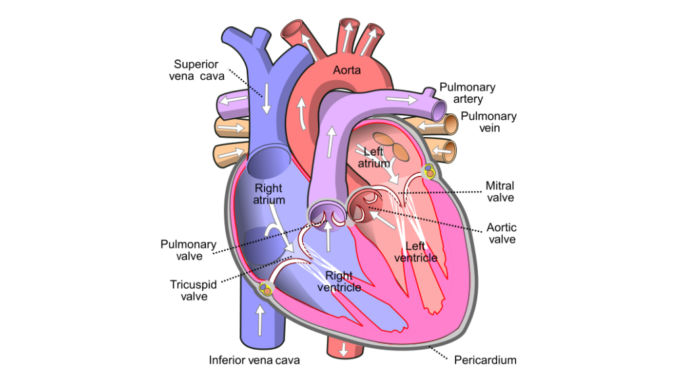
Wapcaplet, CC BY-SA 3.0, via Wikimedia Commons
Atrial Fibrillation is a condition where irregular heartbeats of certain rhythms create blood clots in a chamber of the heart and its possible that a clot could cause a stroke. A detailed description can be found here Atrial fibrillation (AF) | British Heart Foundation (bhf.org.uk),
I wrote an article detailing my own experiences with irregular heartbeats and correlating with taking the Vaxx. https://going-postal.com/2022/01/ive-seen-the-vaxx-and-the-damage-done/ “I’ve seen the Vaxx and the Damage Done”.
I had a 24 hr heart monitor and Echocardiogram and a few days ago the senior cardiology consultant phoned me with the results. I’m actually in good shape. When I tentatively told him that I detected increased arrythmia post the Vaxx he said:-
“I’d be more surprised if you told me that nothing happened because this is what the vaccine is designed to do”
Let us be clear. He didn’t mean that the vaxx is designed to give you heart problems. What he means is that one of the effects of the vaxx is to screw around with body chemistry in some way. Body chemistry affects heartbeat by interfering with things like electrolytes which control the heartbeat clock which is known as the sinus rhythm.
AFIB is not initially a disorder of the heart but rather the effect of irregular heartbeat controlled by your sinus rhythm causing the blood clots in the heart chamber.
When I asked “Did you detect any AFIB or irregular heartbeats in your 24 hr monitor” the answer was “No, but the occurrences might be so infrequent that we can’t capture them”. My relief is that I don’t have chronic and serious AFIB otherwise they would have been seen.
Since I have been unable to detect any irregular heartbeat activity for maybe twelve weeks then I have led myself to the conclusion that any AFIB activity has to be down to body chemistry post Vaxx and not an inherent weakness in my cardio-vascular system.
I told him “Sometimes I have had some heart palpitations but not detected any irregular heartbeat. But I have found that a supplement of potassium & magnesium has seemed to subdue it after an hour”. His response was that he agreed that potassium and magnesium do play a role in keeping a regular heartbeat.
I correlate this with my having been on a keto style diet and irregular eating of unbalanced meals. That is why there are supplements called “Keto Electrolytes” because the phenomena of an unbalanced nutritional keto diet is understood.
If you read literature about AFIB you will see that the reasons why AFIB develops isn’t understood. But in a way it IS because we know its caused by irregular heartbeats of a certain pattern. Imagine a regular heartbeat:-
Boom———————————-Boom—————————-Boom
An AFIB pattern is:-
Boom—-^—–^—^——^——^—–Boom——^—^——-^—–^—-Boom
Imagine the heartbeat rattling your heart between regular beats
And since the heartbeat is controlled by your sinus rhythm and THAT is controlled by body chemistry then my conclusion is that anything that screws with it whether diet or vaxx is the root of AFIB.
Note that there are some irregular heartbeats that are actually caused by heart chamber defects so body chemistry isn’t necessarily to blame for them all.
We have many anecdotes of people developing heart problems after taking the vaxx. I know of two such cases in people of 60+. I wonder how many of them already had lifestyles or undiagnosed medical conditions made worse by the vaxx. The question is:-
“Were they caused by the vaxx or that the vaxx exposed a weakness and exploited it in a way that was not predictable”
I think it is the latter case.
The conclusion that I had AFIB was based on my own ECG trace on my hand-held device. I sent the trace to my GP who sent it to the cardiology department and the specialist came back to them and said “AFIB”. The GP prescribed a blood thinner Edoxaban with the warning that it would prevent a stroke but I could get a brain bleed. After a week of taking it I detected no arrythmias but did get headaches so I stopped taking it.
My logic is that if my body chemistry doesn’t induce the AFIB pattern then I don’t have an AFIB risk but the Edoxaban carries a brain bleed risk.
I have always been an advocate that you have to take responsibility for managing your own health. You have to understand what is going-on and not just rely on doctors whose solutions are often pills. You need to ask questions and we have individual technologies of personal ECG monitors, heart rate monitors on watches, BP monitors and Spo2 finger monitors to guide those question (I have all of them!). For example, I could tell my GP I had arrythmia but I also knew enough to provide answers, without being asked, about there being no chest pains, no racing pulse, no breathlessness, standard blood pressure for me and an SpO2 of 99%. All of these suggested I didn’t have a heart problem and the echocardiogram confirmed it.
The consultant actually agreed with me and said that he wouldn’t recommend to my GP to re-instate Edoxaban but that he would rely on my own monitoring to determine if I was at risk and then request Edoxaban myself. In fact, my GP now agrees and has reinstated Naproxen (pain-killer and anti-inflammatory which should not be taken with Edoxaban)
With the heart it is possible to monitor for problems in a way that the NHS can’t. With the internet its possible to get additional advice and with some detective work you might work out what may be going wrong. The era of “Doctors are smart and patients are dumb” is no longer. I have found that doctors actually appreciate it when you question them and apply some logic to the discussion. They are happy that you take an interest in your health and don’t just leave it all to them. My GP actually said to me “I’m grateful that you are taking such good care of your heath”. Given how difficult it is to see a GP face-to-face and to see a specialist for a diagnosis it is even more crucial that we take care of our own health as far as possible.
As an aside, as a diabetic for 45+ years I eventually learnt ten years ago how to manage, control and monitor diabetes effectively myself. My GP understands why I don’t bother to see a diabetic specialist or see the diabetic nurse. I don’t need their advice. She’s happy with my Hba1C results. In fact some of the advice I have received from them over the years has not been useful. My diabetic control is better in the last five years than it has ever been due to my own diligence and understanding. “Be Your Own Pancreas” is my motto.
Good Health to You All!
© Lugosi July 2022



